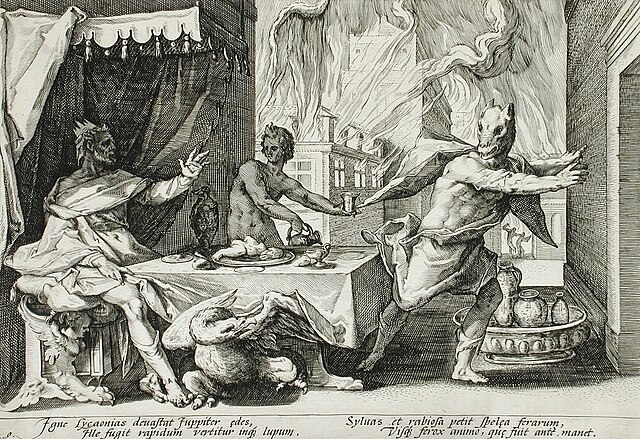Top Qs
Timeline
Chat
Perspective
Lycaon (king of Arcadia)
Greek mythical character, king of Arcadia, son of Pelasgus and Meliboea From Wikipedia, the free encyclopedia
Remove ads
In Greek mythology, Lycaon (/laɪˈkeɪɒn/; Attic Greek: Λυκάων, romanized: Lukáōn, Attic Greek: [ly.kǎː.ɔːn]) was a king of Arcadia who, in the most popular version of the myth, killed and cooked his son Nyctimus and served him to Zeus, to see whether the god was sufficiently all-knowing to recognize human flesh. Disgusted, Zeus transformed Lycaon into a wolf, while Nyctimus was restored to life.

Despite being notorious for his horrific deeds, Lycaon was also remembered as a culture hero: he was believed to have founded the city Lycosura, to have established a cult of Zeus Lycaeus and to have started the tradition of the Lycaean Games, which Pausanias thinks were older than the Panathenaic Games.[1] According to Gaius Julius Hyginus (d. AD 17), Lycaon dedicated the first temple to Hermes of Cyllene.[2]
Remove ads
Family
Summarize
Perspective
Lycaon was the son of Pelasgus[2][3] and either the Oceanid Meliboea[4][5][AI-generated translation?] or Deianira, daughter of an elder Lycaon.[6] His wife was called Cyllene, an Oread nymph who gave her name to Mount Cyllenê[7] though sometimes she was regarded as his mother instead.[8][3] In some accounts, the Arcadian town Nonakris was thought to have been named after his wife.[9] Lycaon was also known to have had at least three daughters: Callisto, Dia,[10][11][AI-generated translation?] and Psophis.[12]
Sons of Lycaon
According to the Bibliotheca (Pseudo-Apollodorus), Lycaon has 50 sons.[13] An alternate list of Lycaon's sons is given by Pausanias. According to his account, almost each of them founded a city in Arcadia and became its eponym.[14]
Remove ads
Mythology
Summarize
Perspective
There are several versions of the Lycaon myth already reported by Hesiod (Fragmenta astronomica, by Eratosthenes, Catasterismi), told by several authors. The most popular version is the one reported by Ovid in the first book of his Metamorphoses.
The different versions of the myth are as follows:[21]
- According to the Bibliotheca, Lycaon had sired 50 sons with many wives. These sons were the most nefarious and carefree of all people. To test them, Zeus visited them in the form of a peasant. They mixed the entrails of a child into the god's meal, whereupon the enraged Zeus threw the meal over the table, which explains the name of the city Trapezus (from τραπέζι, table), and killed Lycaon and his sons with lightning. Only the youngest son, Nyctimus, was saved due to the intervention of Gaia.[22]
- John Tzetzes records two similar versions which agree with Apollodorus's account; one mentions that the idea to serve Zeus a slaughtered child belonged to Maenalus, one of Lycaon's sons, while the other makes Nyctimus the victim.[15]
- According to Pausanias, Lycaon was instantly transformed into a wolf after sacrificing a child on the altar of Zeus and sprinkling the blood on the altar.[23]
- According to Lycophron, all were transformed into wolves for having devoured Nyctimus. Lycophron extends the characteristics of Lycaon and his sons onto all the Arcadians.[24]
- The version recounted by Hyginus in his Fabulae[25] is basically the same as that of Pseudo-Apollodorus. In Astronomica, Hyginus describes the victim of Lycaon as being Arcas, son of Jupiter (Zeus) and Callisto, the daughter of Lycaon. Restored to life, Arcas was brought up to be a hunter. His mother was subsequently transformed into a bear, whom Arcas pursued without realizing her true identity; they strayed into a temple where entrance was punished by death. Zeus saved them both by turning them into the constellations Arctophylax and Ursa Major, the Great Bear.[26]
- Nicolaus Damascenus tells that Lycaon's sons were nefarious. To test Zeus, they mixed the flesh of a boy into the sacrifices, whereupon all who were present during the murder of the child were killed by lightning.
- According to Ovid, Lycaon mistrusted and derided the signs of Zeus's divine nature which the god openly demonstrated upon arrival to Arcadia. Determined to find out whether the guest was truly a god or a mortal, Lycaon served Zeus the flesh of a prisoner, partly cooked and partly roasted. Moreover, in his quest to test Zeus's immortality, Lycaon attempted to murder the god while he slept. Thereupon, Zeus brought the roof down and transformed the fleeing Lycaon into a wolf.[27]
- According to the dictionary Suda, Lycaon had diligently been guarding the laws established by his father for the Arcadian people. In order to keep his subjects from injustice, he would tell them that Zeus frequented his home in the guise of a mortal man so as to keep watch over how lawful the humans were. One day, when he was about to perform a sacrifice, the people were eager to know if the god was present; to find out if Lycaon told them the truth about Zeus's visits, they killed one of the king's fifty sons and mixed him in with the sacrificial meat, whereupon all of them were killed by lightning.[28]
- According to Eratosthenes, Lycaon butchered his grandson (that is, Arcas), who was put together again by Zeus and placed upon the constellations, whereas Lycaon's house was struck by a thunderbolt.[29]
Remove ads
See also
- Child cannibalism
- Damarchus
- Lykaia
- Tantalus
- Werewolf (lycanthropy)
Notes
References
External links
Wikiwand - on
Seamless Wikipedia browsing. On steroids.
Remove ads
